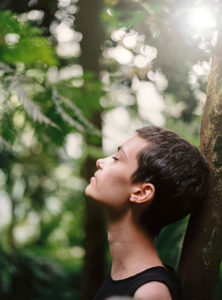HUMANISM & THE ARTS | Art and the Nature of Spirituality
 Photo by Motoki Tonn on Unsplash
Photo by Motoki Tonn on Unsplash We surely live in rapidly changing times. So much of that change has come about by technology, especially technology that has connected people around the world and granted access to the vast knowledge of humanity. Much of what we have come to see as normal today was barely the stuff of science fiction when I was born in 1957. In so many ways science has been the agent and engine of change that has evolved the structures and expectations of societies everywhere. There is no place where this is more apparent than in the rapidly changing relationship with religion as witnessed in much of the world, especially in industrialized nations. It has manifested in the United States where attitudes and beliefs seem to change as rapidly as the pages in a calendar. The abandonment of my strict Roman Catholic upbringing in the late 1970s came at a time when one would be truly unwise to admit such a lack of belief even to members of one’s own family. Today, we see more than one-third of young people claiming no religious affiliation in any personal or institutional sense.
As is so often the case for everything gained, there will be things lost and lost forever. This realization does not come without concern, even by those who have seen fit to abandon superstition and fanciful fictions in their own lives. There is one thing that we hear again and again when people are questioned about how they see their lives in the absence of the religion that defined the lives of their parents and grandparents. “I am not religious, but I consider myself a spiritual person.” It is something I have said myself and something I still say—even as a nontheist. After all, though our lives are defined in many ways by the machines we have made, we see that they are not us, that there must be something else. In many cultures and languages that something else can be referred to as spirituality. I will contend that this notion is not in conflict with seeing ourselves as atheists, agnostics, or humanists. I will further contend that it is a necessary part of a full life.
For me, spirituality has always identified those parts of our lives that connect most deeply to our humanity and how we see this connectedness to the wonders and mysteries of the world around us. In the simplest terms, one might find a multitude of descriptions of love. There might be no concept that so inhabits the minds and the hearts of human beings. There is no precise definition of love, yet many will say they know what love is. We know what love is because it is part of our spirituality.
The word spirituality is also challenging to define, although many of us claim it without hesitation. The word spirit itself derives from both Latin and Greek, as well as other more recent languages. It simply means to breathe. In the purest sense, our notion of being alive has its central evidence in the simple act of breathing. In a larger sense, breathing or spirit is the one thing that unites all of us as we share the atmosphere with all living things. The oxygen we inhale with each breath was exhaled by the plants of the world, just as they inhale the carbon dioxide we exhale.
But how do we express this spirituality that seems so apparent in our lives?
I would proffer that, especially in the absence or diminished significance of religiosity, we express this through art. Even in the days when the religious order was also the social order of the world, art provided the adornments of ritual, ceremony, and community. In many cultures the visual arts, literature, and music were the binding elements of theology, continuity, and ritual. Ironically, in some distant future where superstition and religious bigotry are just quaint notations in history books, the art which suffused their existence through the centuries and which defined the highest ideals will survive.
As a person who has dedicated his life to the writing of poetry as a means of describing things that defy description and creating something memorable and beautiful, the word spirituality has always held a profound meaning. I can only feel deep grief for those who resist, who do not embrace their own spirituality in any way that makes sense to them. The desire for it is one of the most human sensations we can experience, and we are invested with it by our wish for understanding, fulfillment, and our ability to wonder. We do not need to offer an apology or explanation when we say that we live our lives without gods or superstition, and yet believe we are spiritual beings. This finite time we all share has much to offer, especially from those artists among us, as well as those who came before us seeking to understand what it means to be a human being in this universal scheme of grandeur and mystery. Breathe, and breathe deeply.
